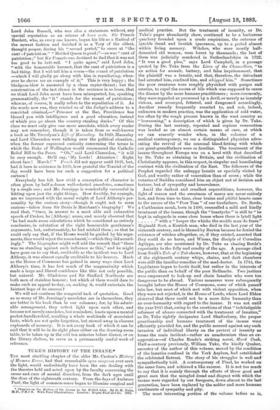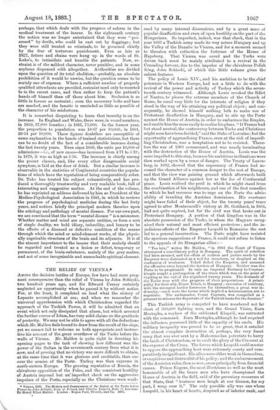PUKE'S HISTORY OF THE INSANE.*
Tun most startling chapter of the elder Mr. Caxton's History of Human Error, had that remarkable opus magnum ever seen the light, would undoubtedly have been the one dealing with the theories held and acted upon by the faculty concerning the cause and cure of mental disorders, from the dark ages until the close of the eighteenth century. From the days of Ambrose Pars, the light of common-sense began to illumine surgical and Chapiers on the History of the Insane in the Britia /gm By D. H. Take, F.R.C.S. With Four Illustrations. London : Began Paul and Co. 1882. medical practice. But the treatment of insanity,. as Dr. Take's pages abundantly show, continued to be a barbarous quackery founded upon a crude empiricism, the outcome of ignoble dread and brutish ignorance, up to a period almost within living memory. Witches, who were mostly half- demented old women, were burnt by thousands ; the last of them was judicially murdered in Sutherlandshire in 1722: " It was a good plea," says Lord Campbell, in a passage quoted by Dr. Tuke from the Lives of the Chancellors, "to an action for assault, battery, and false imprisonment, that the plaintiff was a lunatic, and that, therefore, the defendant had arrested him, confined him, and whipped him." Sometimes the poor creatures were roughly physicked with purges an& emetics, to expel the excess of bile which was supposed to cause• the disease by the more humane practitioners ; more commonly, they were regarded as possessed by a devil, or merely as innately vicious, and scourged, fettered, and dungeoned accordingly. Another remedy frequently resorted to, and not, indeed, unknown in modern practice, was the application of cold water, too often by the rough process known in the west country as " bowssening," a description of which is given by Dr. Tuke.. During the last century, repeated and copious venesection: was lauded as an almost certain means of cure, at which we can scarcely wonder when, in the columns of a-. medical contemporary, we see a distinguished physician advo- cating the revival of the seasonal blood-letting with whichr our great-grandfathers were so familiar. The treatment of the insane throughout Europe was on a level with that described' by Dr. Tuke as obtaining in Britain, and the civilisation of Christianity appears, in this respect, in singular and humiliating contrast with the civilisation of the East. The followers of the Prophet regarded the unhappy lunatic as specially visited by God, and worthy rather of veneration than of scorn ; while the. votaries of Buddha considered him an object not of derision and torture, but of sympathy and benevolence.
Amid the darkest and cruellest superstitions, however, the light of reason and the sweetness of mercy are never entirely- lost, and from time to time, clear brains and pitiful hearts came' to the rescue of the "Poor Tom" of our forefathers. Dr. Borde, a Carthusian monk, born in 1490, counselled a mild and kindly treatment of the insane, though the "lunatycke " is still to " be kept in safegarde in some close house where there is lytell light " with a " keeper the whiche the modde man do feare."` Reginald Scot, a Kentish man, who died in the last year of the sixteenth century, and is blamed by Burton because he denied the existence of witches altogether, or, if they existed, asserted that they could do no harm, and Wiems, the disciple of Cornelius Agrippa, are also mentioned by Dr. Tuke as sharing Borde's superiority to the folly and cruelty of the age. A passage cited from Swift's Tale of a Tub shows, however, that at the beginning- of the eighteenth century whips, chains, and dark chambers were still the familiar remedies of the mad-doctor. In 1744, the Legislature began to bestir itself, but rather in the interests of the public than on behalf of the poor Bedlamite. Two justices were empowered to lock-up and chain lunatics who were ton dangerous to be abroad. Various measures were subsequently brought before the House of Commons, some of which passe& into law, but most of which met with violent opposition, when they were not rejected, in the House of Lords, where Lord Eldon observed that there could not be a more false humanity than an over-humanity with regard to the insane. It was not until' the year 1845 that, owing to the exertions of that "indefatigable reformer of abuses connected with the treatment of lunatics,' as Dr. Tuke rightly designates Lord Shaftesbury, the proper guardianship and humane treatment of the insane were efficiently provided for, and the public assured against any such invasion of individual liberty on the pretext of insanity as forms the main incident—rather an anachronism than an ex- aggeration—of Charles Reade's striking novel, Hard Cash. Half-a-century previously, William Puke, the kindly Quaker, ancestor of the author of this volume, moved by the condition of the lunatics confined in the York Asylum, had established the celebrated Retreat. The story of his struggles is well and sympathetically told. A contemporary of Pinel, he worked on the same lines, and achieved a like success. It is not too much to say that it is mainly through the efforts of these good and great men that the mingled dread and disgust with which the insane were regarded by our foregoers, down almost to the last' generation, have been replaced by the nobler and more humane sentiments of sympathy and pity.
The most interesting portion of the volume before us is, perhaps, that which deals with the progress of reform in the medical treatment of the insane. In the eighteenth century the notion was no longer entertained that they were " pos- sessed" by devils, who could be cast out by floggings ; but they were still treated as criminals, to be governed chiefly by the fear of torturous punishment. Even as late as 1827, fetters and chains were hung up in the wards of St. Luke's, to intimidate and humble the patients. Now, re- straint is of the mildest character, never punitive, and in some asylums dispensed with altogether. Authorities are divided -upon the question of its total abolition,—probably, an absolute prohibition of it would be unwise, but the question seems to be mainly one of expense. Where a sufficient number of properly qualified attendants are provided, restraint need only be resorted to in the rarest cases, and then rather to keep the patient's hands off himself than off those about him. Seclusion is as little in favour as restraint ; even the necessary bolts and bars are masked, and the lunatic is reminded as little as possible of the character of his misfortune.
It is somewhat disquieting to learn that insanity is on the increase. In England and Wales, there were, in round numbers, in 1859, 37,000 lunatics ; in 1881, 73,000. In the former year, the proportion to population was 18'67 per 10,000; in 1881, 28'34 per 10,000. These figures doubtless are susceptible of some explanation in the hands of trained statisticians, but there can be no doubt of the fact of a considerable increase during the last twenty years. Even since 1869, the ratio per 10,000 of admissions—i.e., of new cases—has increased from 4'71 to 5'19; in 1878, it was as high as 5'36. The increase is chiefly among the poorer classes, and, like every other disagreeable social symptom, is laid at the door of drink. But a similar increase is observable in the statistics of Continental countries the popula- tions of which have the reputation of being comparatively sober. Dr. Tuke has treated his subject exhaustively, and has pro- duced a thoroughly trustworthy and very readable book, full of interesting and suggestive matter. At the end of the volume, he has reprinted an address delivered by him as President of the Medico-Psychological Association in 1881, in which he reviews the progress of psychological medicine during the last forty years, and notices briefly the principal modern theories upon the astiology and pathology of mental disease. For our own part, we are convinced that the term " mental disease " is a misnomer. Whether matter and mind are separate entities, or form a sort of single duality, we hold idiocy, imbecility, and lunacy to be the effects of a diseased or defective condition of the means through which the mind or mind-element works, of the physic- ally cognisable structure of the brain and its adjuncts. It is of the utmost importance to the insane that their malady should be regarded and treated as a lesion or defect, temporary or permanent, of the brain-substance, mainly of the grey matter, and not of some incognisable and unreachable spiritual element.



































 Previous page
Previous page